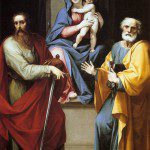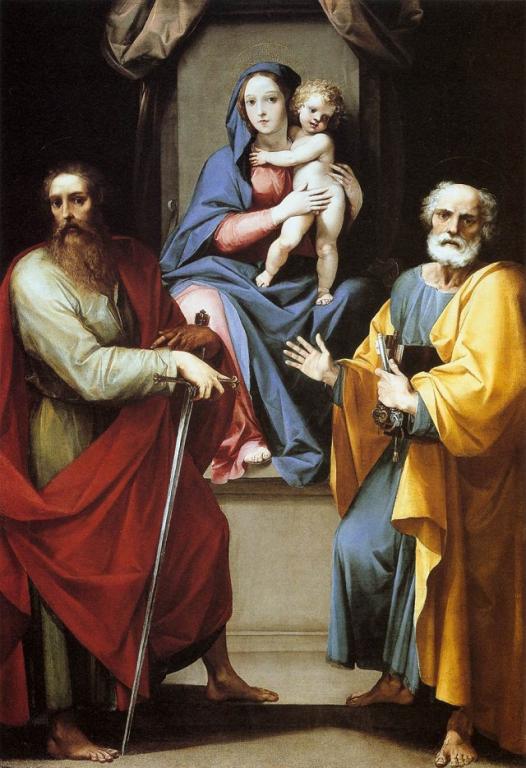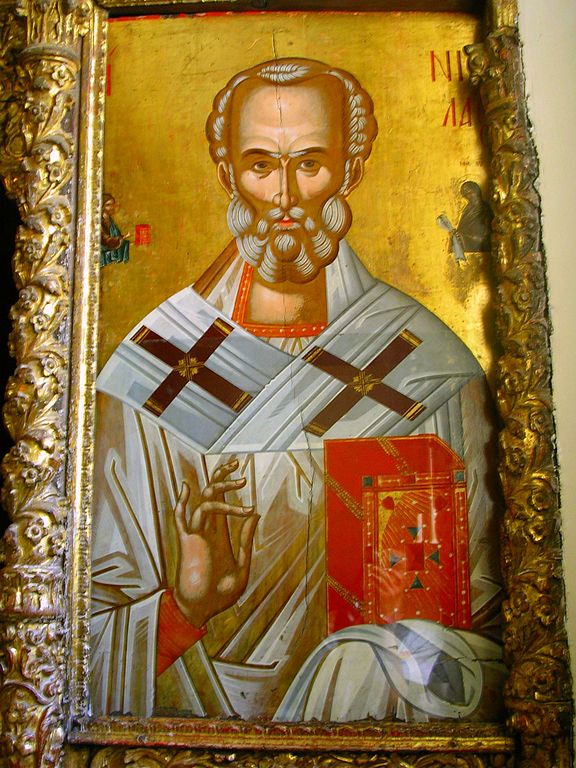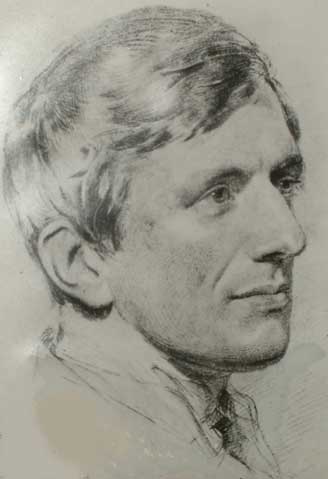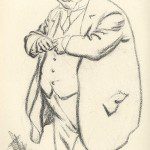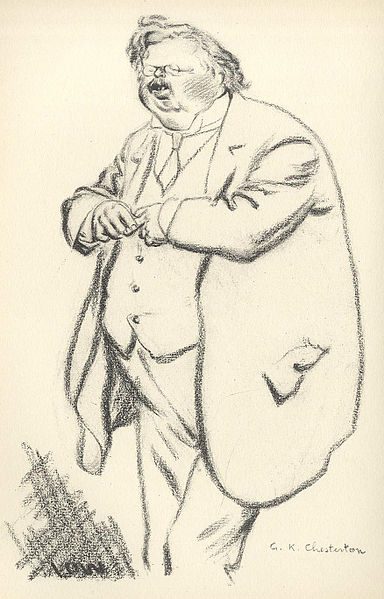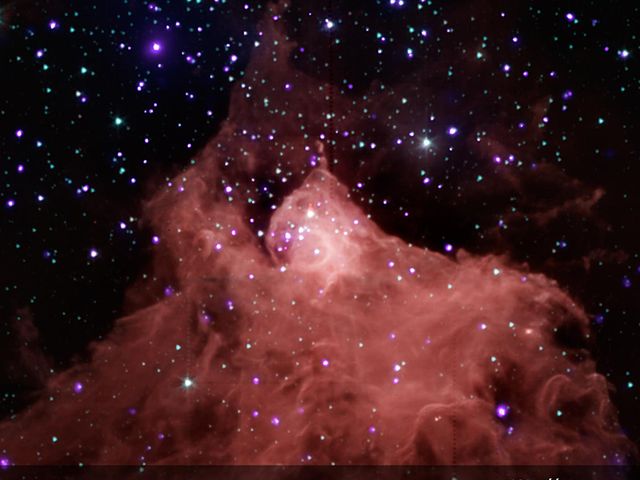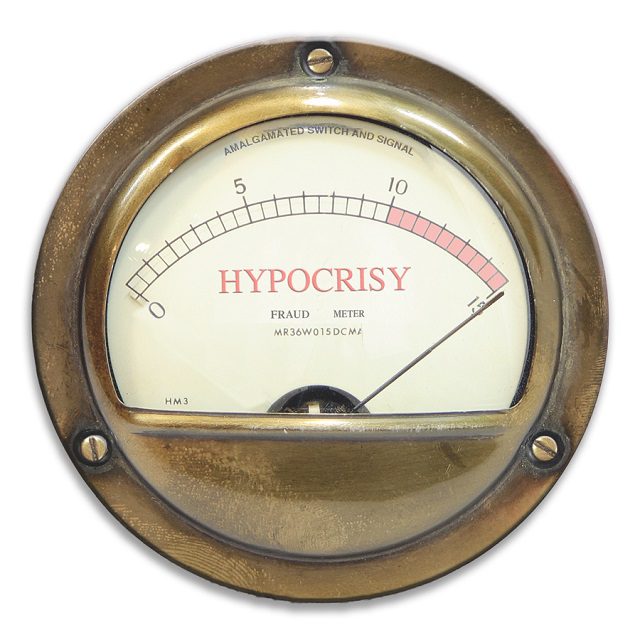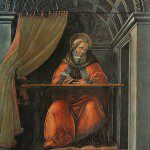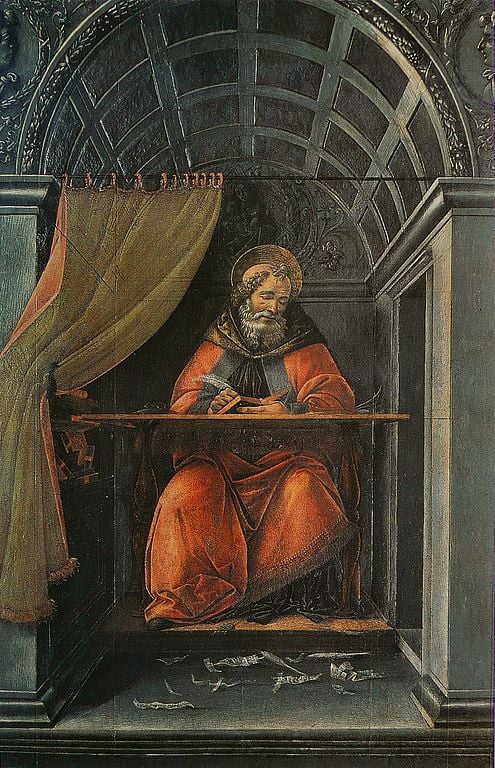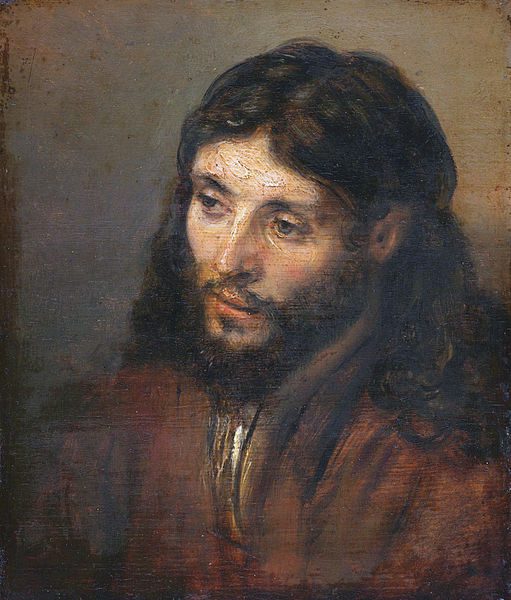Reply to Failed Anti-Catholic Protestant Attempts to Tear Down St. Peter and His Papal Authority
(8-10-12)* * * * *
One of my better-known articles / papers is my piece, 50 New Testament Proofs for Petrine Primacy and the Papacy, which was part of my first book, A Biblical Defense of Catholicism (2001), and published in The Catholic Answer in Jan / Feb. 1997, right before I put up my website.
Lo and behold, an anti-Catholic Protestant apologist named Jason Engwer, wrote, back in 2002, a turn-the-tables rhetorical reply to my piece, which he called, “51 New Testament Proofs for Pauline Primacy and the Papacy.” I refuted that, and he made another counter-reply, which I rebutted also.
Apparently his paper was no longer online, and someone made a request for him to re-post it (which he did). Here is his current explanation about what he was trying to accomplish:
I wrote it in response to a Roman Catholic apologist’s list of 50 alleged Biblical proofs of a Petrine papacy. Some of the items in my list are meant to parallel items in that Catholic’s list. For example, he cited the performance of a miracle through Peter’s shadow (Acts 5:15) as evidence of Petrine primacy. I paralleled that with a citation of Acts 19:11-12 as evidence of Pauline primacy. I don’t actually think a Pauline papacy is implied by Acts 19 or any other passage I cite below. What I was doing was demonstrating how the same sort of bad reasoning that Catholics often apply to Peter can be cited to justify similar conclusions about other Biblical figures, like Paul.
Catholics can’t object to my list by pointing to post-Biblical evidence for a Petrine papacy, since the issue under discussion is whether the Biblical evidence supports a papacy. Nobody denies that a Petrine papacy eventually developed in Rome. The question in this context is whether that papacy was just a later development or is a teaching of the scriptures as well.
Amidst the usual worthless anti-Catholic bilge in the comments for Jason’s paper, the guy who requested him to post it (a former Catholic, just for the record) made some remarks: a few of which I will reply to, as sort of a fun continuation of the spirit of my two rebuttals. He gushed in rapt admiration:
Jason, this article is a CLASSIC (!!!!!). Thanks for posting it again. In my opinion, your Biblical argument for Pauline Papacy is SOOOOOO much stronger than Catholic Biblical arguments for Petrine Papacy. You BEAT them (not merely match them) at their own sophistical game.
Jason, no doubt by a mere inadvertent oversight (seeing that he was kind enough to also keep my name anonymous), neglected to mention that I responded at great length not only to this paper of his, but also to his follow-up effort. For any who care to read both sides of a dispute (I know that that is sort of a quaint outdated custom these days), here they are.
Suffice it to say that Jason’s was a failed effort. He didn’t prove at all what he set out to prove, and Petrine primacy, as indicated in the Bible, is as strong as ever, with the Pauline data not undermining it one bit: neither in point of fact nor in terms of turning-the-tables rhetoric, counter-analogy, or reductio ad absurdum (as in Jason’s paper).
So, here are some things I would add to your list (though, they are already there implicitly).
Regarding: . . .
#37. The demons don’t recognize Peter.
In context, why would they? The context of Paul being named was Paul’s handkerchiefs healing folks and casting demons out of them (Acts 19:11-12): which is precisely a secondary relic in Catholic theology: God using an object connected to a holy person to bring about miracles. Even Peter’s shadow healed folks (Acts 5:15), so the two were not unlike in that respect.
The Jewish exorcists specifically mention Jesus and Paul (Acts 19:13-14). Therefore, the demon answered and said, “Jesus I know, and Paul I know” (Acts 19:15).
It doesn’t follow (in any sense) that they would never mention (or “recognize”) Peter in another context, or that Paul is therefore above Peter, simply because Paul was mentioned in this instance and the demon recognized his name. Nothing is proven by this example.
Even if the NT doesn’t mention a specific example of Peter being named by a demon, that isn’t proof that it never happened; only proof that it is not recorded in the Bible (as many many things were not).
We know, in any event, from the Gospels, that Peter, as one of the twelve, cast out demons.
Much ado about nothing . . .
#1 . . . Peter is never said to be an apostle to Gentiles; but only the Jews. . . .
How very odd, then, that God gave Peter the vision of all foods being clean: an issue that had specifically to do with Gentiles in relation to Jewish law (Acts 10:9-16).
Doubly odd (given what you claim) is the fact that Cornelius, a Roman Gentile, was told by an angel specifically to seek out Peter, and he sent men to beseech him (Acts 10:1-8, 17-18).
Peter is told by the Holy Spirit that they have arrived (Acts 10:19-20). Peter then visited and ate with Cornelius and a great many persons and spoke about how Gentiles were now part of God’s plan of salvation (Acts 10:21-43).
The Holy Spirit then fell upon these men, and Peter baptized them (Acts 10:44-48).
All this (an entire chapter devoted to it), yet you claim that Peter was to preach only to the Jews? Quite a strange position indeed . . . Here God, and angels are communicating all over the place, to Peter and a righteous Gentile, but we are told by you that “Peter is never said to be an apostle to Gentiles” — as if that has any relevance to anything. Here, right in Scripture, we see him reaching out to the Gentiles most dramatically.
It’s one of innumerable Protestant “either/or” false dichotomies that I shoot down almost on a daily basis in my apologetic work.
This particular anti-Catholic site has a record of deleting my comments, so I made sure to preserve them in this new paper. Thanks for the opportunity, guys, to give further support to the primacy of St. Peter over against failed and illogical attempts to shoot him down!
* * *
My opponent came back for a second round. I won’t cite all his words here, but they can be read in the discussion thread. I respond to most of his additional particular counter-arguments:
Dave, you act as if Jason was genuinely attempting to make a case for Pauline Papacy such that his arguments (and my comments) have to make sense. In actual fact, he was attempting to show how Catholic-style eisegesis (not exegesis) could be used to argue for Pauline Papacy.
I did no such thing. I know exactly what he was trying to do: knew it originally (ten years ago) and now. I can read his own explanation, and in fact, I quoted his explanation of the nature of his counter-argument in my Internet post that I made out of this exchange: precisely so my readers wouldn’t be confused about that (since it is a somewhat complex form of counter-argument).
And so my replies presuppose the nature of the argument utilized. If he or you argue that it is just as plausible or more so, to argue for a Pauline papacy (whether it is merely rhetorical or not doesn’t change the validity of logic or exegesis used), I come back and show how it is not: that the argument fails.
I fully understand it, and I think I refute it on its own terms: not as a straw man. The entire argument fails, period. It was fun to interact with, but I think it is thoroughly fallacious all down the line, and my two long replies show exactly how and why I think that. You expanded upon his reasoning in the same “mode” and I believe I’ve shown how you fail, too. Nothing personal. :-)
Your argument about Peter and demons was that they didn’t “recognize” him. I showed how it fails, by delving into the context of the demons and Paul: from which you derived your argument.
One must also understand the intent of my original paper. I wasn’t claiming that all 50 points were equally strong or earth-shaking. Some are merely interesting in terms of showing that Peter was more eminent in Scripture than is commonly supposed.
Jason’s tongue-in-cheek #37 was “The demons in Acts 19:15 recognize Paul’s primacy.” You follow up with “The demons don’t recognize Peter.” Neither one can withstand scrutiny. The fact remains that these arguments can be shot down, but mine are valid examples from the Bible. The data in Acts about a demon and Paul is irrelevant because it wasn’t tied to primacy in the first place.
The strength of my paper comes from its cumulative effect. Some of the 50 points are far more important (namely, the “rock” and “keys of the kingdom” that are supported by massive Protestant scholarly comments, as to Peter being an extraordinary leader).
There are a lot of quite significant things: Peter was the first to preach the gospel after Pentecost, first to perform a miracle, to raise the dead, to receive the Gentiles into fellowship, to recognize and refute heresy and to pronounce an anathema, etc. These are not insignificant.
It’s not a “wild inference” from Scripture that Peter was the first pope. A guy like F. F. Bruce, after all, could write:
So in the new community which Jesus was about to build, Peter would be, so to speak, chief steward.
(Hard Sayings of Jesus, Downers Grove, Illinois: Intervarsity Press, 1983, 143-144)
Likewise, The New Bible Dictionary:
So Peter, in T.W. Manson’s words, is to be ‘God’s vicegerent . . . The authority of Peter is an authority to declare what is right and wrong for the Christian community. His decisions will be confirmed by God’ (The Sayings of Jesus, 1954, p. 205).
(New Bible Dictionary, edited by J. D. Douglas, Grand Rapids, Michigan: Wm. B. Eerdmans Publishing Co., 1962, 1018)
There’s something going on there. It isn’t just flimsy, arbitrary Catholic propaganda, as you guys pretend. There is real and solid biblical indication of serious, profound leadership, and from this we derive the notion of a pope: the leader of the Christian Church.
Just as James’ statements to the other Apostles of “listen to me [James]” (Acts 15:13) and “Therefore I [James] judge” (verse 19) could be jumped upon to prove Jacobean Papacy. Does anyone doubt that if Peter had said “therefore I judge” that Catholics would use that to argue for Petrine Papacy? I know that when I was a Catholic I personally would have loved for Peter to have said it, rather than James. I would have prayed, “Lord, why didn’t you have Peter say it instead since Peter actually was the Pope? Father, shouldn’t the Holy Spirit not have inspired Scripture to record James’ statement even if he did say it? Why Lord? Why?!?!”
I dealt with this in my latest book, 100 Biblical Arguments Against Sola Scriptura (#74; p. 95):
We learn that “after there was much debate, Peter rose” to address the assembly (15:7). The Bible records his speech, which goes on for five verses. Then it reports that “all the assembly kept silence” (15:12). Paul and Barnabas speak next, not making authoritative pronouncements, but confirming Peter’s exposition, speaking about “signs and wonders God had done through them among the Gentiles” (15:12). Then when James speaks, he refers right back to what “Simeon [Peter] has related” (15:14). Why did James skip right over Paul’s comments and go back to what Peter said? Paul and his associates are subsequently “sent off” by the Council, and they “delivered the letter” (15:30; cf. 16:4).
None of this seems consistent with the notion that Paul was above or even equal to Peter in authority. But it’s perfectly consistent with Peter’s having a preeminent authority. Paul was under the authority of the council, and Peter (along with James, as the Bishop of Jerusalem) presided over it. Paul and Barnabas were sent by “the church” (of Antioch: see 14:26). Then they were sent by the Jerusalem Council (15:25, 30) which was guided by the Holy Spirit (15:28), back to Antioch (15:30).
I stand by my statement that Peter is never said to be an Apostle to the Gentiles (i.e. commissioned to or sent especially to them).
And I stand by my assertion that this is perfectly irrelevant, insofar as we know (from the Bible) that Peter evangelized Gentiles as well as Jews. This is why I showed the example of an entire chapter of Acts, while you insist on playing non sequitur word games.
We have in the Bible, Peter stating at the Jerusalem Council (RSV): “”Brethren, you know that in the early days God made choice among you, that by my mouth the Gentiles should hear the word of the gospel and believe.” (Acts 15:7).
The great Bible scholar and self-described “Paulinist” F. F. Bruce, in his book, Peter, Stephen, James, & John (Eerdmans, 1979, p. 32) states:
That Peter’s missionary activity was not restricted to Jews is implied here and there in the New Testament. . . . 1 Peter . . . is addressed in Peter’s name to Gentile converts in various provinces of Asia Minor (including two which were evangelized by Paul).
2 Peter also seems to be addressed to Gentiles, though it is debatable.
Bruce also noted (p. 33) that Peter was among the eleven disciples that Jesus commissioned to “make disciples of all nations” (Matthew 28:19 ff.): thus obviously including Gentiles. So we know that Peter did indeed have such a commission.
We Protestants acknowledge all of those passages and conclude that none was above another in authority (even if Peter was a “leader” of sorts). . . . Actually, it’s you who doesn’t properly acknowledge the other passages we cite that balances the truth of Peter’s position in the early Church.
It’s not just me, nor just Catholics. In my book on the papacy I cite a host of Protestant scholars who agree with a Bible-based Petrine primacy (based on “rock” and “keys of the kingdom” and other passages); so do even the Orthodox [see. e.g., The Primacy of Peter, edited by John Meyendorff (St Vladimir’s Seminary Press, 1992].
You’re not even in line with John Calvin, for heaven’s sake, who wrote:
One was chief among the apostles, . . . That twelve had one among them to direct all is nothing strange. Nature admits, the human mind requires, that in every meeting, though all are equal in power, there should be one as a kind of moderator to whom the others should look up. There is no senate without a consul, no bench of judges without a president or chancellor, no college without a provost, no company without a master. Thus there would be no absurdity were we to confess that the apostles had conferred such a primacy on Peter.
(Institutes, Book IV, 6:8)
This was part of my book about Calvin. You don’t even appear to be aware of it, since you claim that Protestants en masse deny that Peter had primacy.
Not Calvin, and not lots of other Protestant scholars, whose word carries far more weight in your circles and in the world of Bible commentary than yours or Jason’s.
3) Furthermore, he neglected to mention that I responded at length not only to this paper at the time, but also his follow-up paper. Dialogue or debate is not Jason’s forte (he once departed a major one with me in the large anti-Catholic forum CARM in mid-stream), but he loves the one-way lectures, with no mention of any replies made.
What do these people have to hide, if they are supposedly so confident of the superiority of their case over against the one true Catholic Church? What are they so scared of?
Thanks for your kind words. It has been an enjoyable dialogue. I wanted to preface any reply by noting the curious irony of the structure of all your questions: “If the Papacy is true, why [Bible passages x, y, z, etc.] . . . ?”
This is, of course, an argument from plausibility: precisely similar to many in my 50 Petrine Bible Proofs. But you and Jason have bashed that form of argument when I make it on behalf of a papacy. He described my method as “the same sort of bad reasoning that Catholics often apply to Peter.” You called it “Catholic-style eisegesis” and a “sophistical game.”
The logical structure of most (but not all) of my 50 proofs was:
1. “IF we assume for the sake of argument that Peter was indeed a leader / “pope” then would the (presented) data in the Bible about Peter be consistent with that notion?”
You simply flip that around, using the same logical structure for the opposite proposed conclusion:
2. “IF we assume for the sake of argument that Peter was NOT a leader / “pope” then wouldn’t the (presented) data in the Bible about Peter be consistent with that notion and inconsistent with his being pope?”
It’s the same sort of argument: from plausibility, analogy, and strong to the degree that it creates a cumulative effect: if each point can be solidly defended under scrutiny.
Therefore, since (far as I can tell), your fifteen questions are perfectly serious: not merely a reductio that utilizes (as you view it) unworthy Catholic eisegetical methods, how is it that it is legitimate exegetical analysis or permissible speculation when you use it to argue against the papacy, but sophistical eisegesis when I use it to defend same?
You seem to be perfectly serious, rather than tongue-in-cheek or turning the tables (merely rhetorically) when you state things like “for someone like myself, these questions seriously call into question the concept of the Papacy.” That’s not just joking and fooling around, is it?
It seems to me, then, that if you wish to argue in this way, you have to retract your opinion of my method as a whole in my 50 Proofs paper. You can still, of course, disagree with my particular and broad conclusions (just as all Bible exegetes will question others in good faith).
That is much different, however, from questioning the entire methodology from a to z, and classifying it as “sophistical eisegesis” etc. It’s simply attempted exegesis that you disagree with for [biblical] reasons a, b, c.
We could also compare your method and mine in another way by using your exactly stated structure:
AP: “If the Papacy is true, why [Bible passages x, y, z, etc.] . . . ?”
Dave: “If the Papacy is untrue, why [Bible passages x, y, z, etc.] . . . ?”
You say I can’t and shouldn’t argue in that fashion in my paper, yet you are allowed to do it with your 15 questions? It’s a disconnect and inconsistent.
Either both are legitimate forms of argumentation (considered apart from the particular premises and conclusions drawn) or neither is. It can’t be (logically) that one is legitimate and the other not. For elaboration on arguments from plausibility, see this book devoted to it (esp. p. 3 ff.).
Paul and Barnabas were sent by “the church” (of Antioch: see 14:26).
You imply that being sent signifies that Paul wasn’t Pope. Then what do you do with Acts 8:14 which says, “Now when the apostles which were at Jerusalem heard that Samaria had received the word of God, they sent unto them Peter and John:“? By the use of your own logic, Peter wasn’t Pope because he himself was “sent” by the Apostles.
I think this is a good point. Let me try to give my best answer. In context, I made this remark in my recent book a section that started off by stating, “Paul’s ministry was not ‘self-validating.'” I was trying to overthrow a rather common Protestant outlook that regards Paul as totally above all assemblies and churches and sort of a lone ranger apostle: as if he could never conceivably be told to do anything by a mere local assembly..
The Catholic view holds that Peter is above all churches in terms of being the first pope, but we also think that categories of ecclesiology were fluid and less developed than they were later on (just as trinitarian theology was). Thus, we have no problem with instances where it doesn’t seem as “worked out” as it is later on.
But beyond that. we can also surmise that St. Peter was humble enough to be sent by a group of apostles in Jerusalem, even assuming he was the leader. He listened to the judgment of the Church, just as popes today work in concert with ecumenical councils. This doesn’t necessarily imply inequality, since the Father sent the son and the Holy Spirit, while they remained equal with Him. Jesus as a boy was “subject” to Joseph and Mary, even though he was God and they were creatures.
Imagine as an analogy, the President of the United States having a conference with his cabinet, about a serious crisis in a foreign country. They decide together that it is best for the President and the Secretary of tate to visit the trouble spot. So in that sense the group sent the leader, but he remained the leader all the while.
I realize, though, that this could all apply to Paul, too, so it is a point well taken. The bottom line about Peter remains all the particular distinctives and prerogatives given to him that were not seen even in an apostle as great as Paul. Like I’ve said, it is a cumulative argument, and the evidence becomes strong when seen all together.
None of this seems consistent with the notion that Paul was above or even equal to Peter in authority. But it’s perfectly consistent with Peter’s having a preeminent authority.
Just because it’s “consistent” with it, doesn’t prove it.
I agree. All I claimed above (in your very quotation from me) was that it was consistent with Peter, but not with Paul. Logical inconsistency can, however, rule out certain things, even if it doesn’t prove others. It depends on the nature of the argument, as I discussed above. Arguments from analogy or accumulation of themes are not ironclad proofs. But they can be quite strong, as more pieces are found to fit into them.
I think the cumulative case, rightly understood, and not caricatured, is very strong. It may not be absolute proof (not like, say, “God exists” or “man was created,” but it is quite impressive.
If Peter were the Pope, and if he was especially sent to the Jews, then wouldn’t it make sense that he stay in Jerusalem (as the Supreme Pontiff of the Universal Church)? Jerusalem was center and birthplace of the Christian Church. That’s precisely why the council of Jerusalem was held there and not elsewhere.
He spent time there but also elsewhere, as I have shown. He did a lot of evangelization of Gentiles, too.
Again, I agree. This wasn’t part of my original argument for Petrine primacy (which you imply in your comments preceding the above). I was responding here to your additional claim that Paul was sent to Jews and Gentiles and Peter only to Jews. I have now provided about five counter-examples. You then confused my argument on that score with my proofs for primacy; but this is not part of that. It’s simply proving that Peter evangelized Gentiles, too, over against your extreme assertion.
It’s not just me, nor just Catholics. In my book on the papacy I cite a host of Protestant scholars who agree with a Bible-based Petrine primacy (based on “rock” and “keys of the kingdom” and other passages); so do even the orthodox.
Primacy is not equivalent to Papacy.
I agree, which is precisely why I used the word “primacy” above. It’s a prerequisite for papacy, but not equivalent. So you tell me nothing new.
Exactly. But it is not insignificant. It is a strong indication of a possible papacy existing in primitive and less developed form at that time: just as all doctrine develops.
Exactly. Again, you tell me nothing new, that I don’t already know. The reason I brought this up was that you seemed to be denying even the primacy of Peter, so I noted that lots of folks (including John Calvin) don’t go that far. They (the Orthodox and many Protestants) accept it, while denying a papacy based upon it. It all depends on what one is trying to prove at any given time. I’m very precise with my terminology and aware of precisely what I am arguing at any given time.
The burden of proof is on Catholics to prove Papacy, not merely to prove things consistent with it.
We can demonstrate or argue for it a lot more successfully than many doctrines of Protestantism can be supported from Scripture (yet you guys casually accept them anyway). Sola Scriptura isn’t at all seen in Scripture (I’ve written two whole books about that). The canon of Scripture obviously isn’t, also. Sola fide is unable to be harmonized with all of Scripture: especially Pauline teachings. Many other false Protestant doctrines (such as denominationalism or a symbolic Eucharist) are difficult if not impossible to establish from Scripture alone. But Protestants have no problem accepting them, almost by osmosis.
It’s only when it comes to Catholicism, that the most rigorous, philosophically compelling evidence is required, in a way that is never applied to the many Protestant doctrines that are radically unbiblical. It’s a double standard (needless to say). And I’ve seen it a hundred times in my apologetics dialogues, if I’ve seen it once. It’s standard Protestant modus operandi.
Good. Then if you grant that Peter was the leader of the apostles, then you are closer to grasping that he was the leader of the Church: since the apostles were the early Church in capsule form. And you can perhaps be persuaded that if there was a leader at first, then God intended for there always to be one, just as with other offices: priest (presbyter or elder in Scripture), deacon, and bishop. That’s just common sense: why would the Church have a leader till Peter died, and not have any leader for the next 2000 years? It makes no sense. But Protestants (typically) simply pick and choose which offices they like and which they will discard.
Previously I said…
However, you’re the one who’s using EITHER/OR [i.e. false dichotomy] thinking in saying, either Peter is the Pope because of the passages you highlight OR Protestants are wrong because they don’t properly acknowledge those passages.
I should have said “However, you’re the one who’s using EITHER/OR [i.e. false dichotomy] thinking in saying, either Peter is the Pope because of the passages you highlight OR these passage shouldn’t exist if he wasn’t the Pope.”
I have defended the logic and form of my arguments above, and have demonstrated, I think, that you use the same form in your 15 points (below).
Let’s be honest. If Peter was the Pope then:
1. Why were the Zebedee brothers asking if they could be Jesus’ right-hand and left-hand men (Matt. 20:20ff) if Jesus already made it clear that Peter was to be the Pope in Matt. 16? Why wouldn’t the Gospel writers correct their misunderstanding and state that Peter was Pope?
The disciples didn’t understand a lot of things, including the necessity of the crucifixion, and that Jesus would rise from the dead (even though He told them repeatedly that they would happen, and arguably made it quite “clear”). Peter likely didn’t know what Jesus meant, himself, when he was being commissioned in Matthew 16. But after he received the Holy Spirit, he did, as seen in his behavior. So why would you think that they would understand this fully? It is an unreasonable demand that has no force. The Gospel writers need nopt spell out everything in declarative statements. They teach mostly by example.
If you are so convinced my 50 proofs are bad ones and unable to withstand scrutiny, then you can take on all 50 yourself. Even Jason Engwer didn’t do that (no one ever has these past 15 years). He chose to engage in a failed reductio instead, that I shot down twice as fallacious and ultimately irrelevant to my arguments.
2. Why wouldn’t Paul make the exception of Peter when he sarcastically referred to “super apostles” (2 Cor. 11:5) if the Papacy is true?
Because this is a non sequitur with regard to Peter. Paul wasn’t referring to real apostles, but sarcastically (11:1: “foolishness”; cf. 11:13-14) to those who preached another Jesus or another gospel.
3. When Paul’s apostleship was questioned by some, why didn’t he immediately appeal to the fact that the Pope acknowledged his genuine apostleship to settle the issue, if the Papacy is true?
In the previous example he used sarcasm and appealed to his preaching of the true gospel over against the heretics. He didn’t have to do that every time. But he did do it in Galatians, where he says rthat he went to see Peter for fifteen days (Gal 1:18) and Peter, James, and John at a later date (2:9): who gave him “the right hand of fellowship.”
4. In light of 1 Cor. 1:12ff and the whole of chapter 3, why wouldn’t Paul refer to Peter as Pope? If the Papacy is true, then there can be a genuine sense in which one could say, “I am of Cephas/Peter”. Even if there might be negative fleshly sense in which it can be said.. Yet Paul doesn’t explicitly affirm or implicitly acknowledge the Papacy. Nor does Paul address the abuses of the Papacy but deals with himself, Peter and Apollos as equals.
You are taking all that out of context. This is an unreasonable, senseless demand, since in that passage Paul was contrasting the Lordship of Jesus Christ (1:10, 13, 17); to the factions made by man. In any event, if someone was “of Peter” and Peter was the head of the universal Church, then that would simply be saying that “I am of the universal Church,” which is perfectly acceptable. Thus, St. Augustine (I’m compiling a book of is quotes right now) habitually referred to Peter as representative of the whole Church in his person.
It seems to me that a Pope cult developed years later (as the Orthodox have documented).
The papacy developed, for sure: a lot more rapidly after persecution ended, as Cardinal Newman has demonstrated and discussed in his Essay on Development. So did many other Christian doctrines, so this is not surprising at all, let alone novel. But there is plenty of indication already in Scripture.
5. If the Papacy is true, why would Paul (in Gal. 2:9) refer to James, Cephas, and John as seeming/reputed pillars of the Church when he knows all along that there is a special sense in which Peter is pope? He refers to all three as if they were equals.
Because there is a sense in Catholic ecclesiology that all bishops are equals. I went through these dynamics earlier in the discussion of Paul and Peter being “sent.” All bishops are “pillars of the Church.”
6. Regarding the same context, if the Papacy were true, why would Paul say what he did in Gal. 2:6?
And from those who seemed to be influential (what they were makes no difference to me; God shows no partiality)—those, I say, who seemed influential added nothing to me.-ESV
But from those who were of high reputation (what they were makes no difference to me; God shows no partiality)– well, those who were of reputation contributed nothing to me.-NASB
Paul implies his equality with them (including Peter).
Not really. He was simply saying that they added nothing to him in terms of his having received the gospel and commission directly from God. It doesn’t follow, however, that he regarded himself as their equals in the Church (which is what is at issue in this debate). This is shown by his notion that he had to have his ministry confirmed by the Church’s leaders. He was consulting with them specifically for that purpose (Gal 2:1-2). He never denies that they were “of repute.”
None of this is inconsistent with the notion of Peter being the leader. Even Paul’s famous hypocrisy rebuke of Peter (one of the great favorites of Protestants) strongly implies this, insofar as Peter is singled out as especially sinful in committing hypocrisy, on the principle of “to whom much is given, much is required.”
That hypocrisy is not inconsistent with leadership is shown in Jesus telling His disciples to follow the teachings of the Pharisees, despite their being hypocritical (Matthew 23).
7. If central authority was essential to Christianity, why didn’t Jesus do something about those others who were preaching in His name (Mark 9:38ff)? If the Papacy were true, why would Jesus say, “For he that is not against us is on our part”? Notice I cited Mark’s gospel. The gospel that may have been based on Peter’s sermons. Why wouldn’t Mark make clear in this passage (or any where else in this gospel) that Peter is the Pope?
At that point the Church per se was not yet formed (the real beginning was after Pentecost). Therefore, leadership issues of that sort were not yet put into place or operation (and not as yet fully understood, since the disciples misunderstood many important things). Jesus was simply saying that if these guys were doing good works in His name, to let them do it: “he that is not against us is for us.”
8. If the Papacy is true, why in John 12:20-22 did Philip go to Andrew and then together they went to Jesus, when Philip could have gone to Peter as the Pope? The only way I can understand this is if the Church didn’t realise Peter was the Pope until later. Maybe after the resurrection. If so, when exactly after the resurrection? Before or after Paul’s conversion? Before or after Peter’s own death? How many generations or centuries afterward?
This is straining at gnats. You don’t even look at what the text says, in your rush to run down Peter and the papacy. And where are you finding all these 15 points? I highly doubt that they are all original with you. The answer here is easy: Peter isn’t Jesus! The text plainly asserts that “we wish to see Jesus.” Why in the world would Philip have to go to Peter, seeing that the inquirers were looking specifically for Jesus? Next objection?
9. If the Papacy is true, why isn’t that office mentioned in Eph 4:11-12, 1 Cor. 12:28-29, 1 & 2 Timothy or Titus?
I guess for the same reason that bishops aren’t mentioned in the Ephesians passage, while they are elsewhere. Neither bishops nor deacons are mentioned in 1 Cor 12:28-29. Obviously, not everything has to be mentioned in every passage, or you yourself wouldn’t argue that there are no bishops in the Bible, because these two passages didn’t mention them, while mentioning many other offices. By the same token, we see Petrine primacy and the papacy in all the various indications I set forth in my paper. peter alone was given the keys, called the “rock”, told to feed the sheep, etc.You want to major on the minors and completely ignore the majors, which is the usual methodology in critiques of the papacy. You argue as the atheist does who denies Christianity and an inspired Bible altogether: poke a 100 supposed holes in something: yet each “poke” is shown to be irrelevant or fallacious upon close scrutiny.
I did an extensive study of Paul’s word usage and discovered some very interesting things:
Colossians, 1 & 2 Thessalonians, Titus, and Philemon neither mention “Scripture” nor cite the OT, and Philippians doesn’t mention the word and makes just one OT citation.
In Ephesians, the Church/Tradition ratio to Scripture is 18-6; other books are similar: Philippians (4-1), Colossians (12-0), 1 Thessalonians (5-0), 2 Thessalonians (3-0), Titus (4-0). Would any sola Scriptura advocate have predicted such an outcome before studying these words? Not likely . . .
By your reasoning, then (that you apply to Peter and the papacy), because five NT books never mention Scripture, it is not our rule of faith. And because tradition or the Church are often mentioned far more than Scripture, therefore, they should be part of the rule of faith, whereas Protestants exclude them.
Meanwhile, you apply a double standard in relation to things you do accept. The Bible nowhere spells out its own canon, yet you accept the standard canon confirmed by the Church in councils in the 4th century (minus the seven books you arbitrarily threw out).
The Bible never teaches sola Scriptura at all, yet you make it one of your pillars, your rule of faith, and build everything else upon it. It’s merely a false tradition of men, and your whole system rests upon it. Meanwhile, you demand excruciating, compelling proof of the papacy, while expecting no proof at all of sola Scriptura, and accepting it in blind faith.
10. If the Papacy is true, why doesn’t Peter (in his epistles) acknowledge or make reference to it? In fact, Peter refers to himself as a “fellow elder” (1 Pet. 5:1ff) in a context where it would be supremely fitting for him to appeal to his position as Pope.
Peter was humble, just as popes are today, referring to themselves as “the servant of the servants of God.” Jesus told His followers not to Lord it over others (in the autocratic sense). The pope is a fellow bishop with other bishops. But he is the leader of them, too. Peter acts as a leader. He lets his actions speak louder than his words. Even Jesus usually did the same. He didn’t go around always saying, “I’m God, I’m God!” He called His disciples (far lesser than Him) brothers and friends and sons, and subjected Himself to Joseph and Mary as a child. God (Jesus as a child) did what a mere created man and woman told Him to do. But you’re saying that a pope can’t even say someone is a fellow elder? It’s absurd. You don’t grasp biblical / Hebraic categories and thinking very well if this is how you argue.
11. If the Papacy is true, then why doesn’t the author of Hebrews acknowledge the Papacy in light of the fact that authority and priesthood are two of the main topics of the book? How could such a supposedly vital and useful office not be referred to in any of the epistles (including Peter’s) or in this very long book (Hebrews)?
Hebrews is about the priesthood of Jesus in particular, not all priests. So this should not surprise anyone. Petrine primacy is referred to in the epistles, though not very explicitly (as the papacy was still a developing doctrine). If you had read my 50 Proofs you would have known this already:
I already mentioned Paul confirming his ministry initially through Peter. But I guess you never saw that passage, huh? Paul distinguishes the Lord’s post-Resurrection appearances to Peter from those to other apostles (1 Cor 15:4-8). Why? He was obviously singling him out as more significant. Paul refers to Peter as distinct among apostles (1 Cor 9:5). Peter acts, by strong implication, as the chief bishop/shepherd of the Church (1 Pet 5:1), since he exhorts all the other bishops, or “elders.” Peter interprets prophecy (2 Pet 1:16-21). Peter corrects those who misuse Paul’s writings (2 Pet 3:15-16). Peter wrote his first epistle from Rome, according to most scholars, as its bishop, and as the universal bishop (or, pope) of the early Church. “Babylon” (1 Pet 5:13) is regarded as code for Rome.
“For those who have eyes to see . . .”
12. If the Papacy is true, why didn’t Christ sent Paul immediately to the Pope to be instructed and have his apostleship legitimized?
I don’t know. But we know that Paul did do so after three years (Gal 1:18). You ignore the significance of that and major on the minors by honing in on the time period. Like I said, you argue exactly like atheists who try to find all these alleged “difficulties” in the Bible. I know, because I’ve debated many of them. I was in a room with 16 one time, answering their rapid fire objections. You lack faith. You need to pray to God to open your eyes to be able to see all this evidence, if you can’t see it, and can only try to relentlessly poke holes. God wants you in the one true Church, in the fullness of faith. He wants you back.
Beats me. Why does God do a lot of things? Why doesn’t he judge and annihilate America, since we have sinned far more than Sodom and Gomorrah ever did, with the blood of some 50 million aborted babies all over us? We don’t understand a lot of things God does.
Instead Christ sends Ananias to Paul. You might say that it’s because Ananias was closer.
God uses whom He wills, for His purposes. He once used a donkey to speak to a prophet..
But Paul didn’t visit Peter for years afterward. In all those years, Paul could have gone to see Peter, or Peter to have seen Paul. When they do meet, Paul refers to Peter and the others as not having “added/contributed anything” to him (Gal. 2:6). How could the Pope not add/contribute anything to Paul?
Dealt with above . . .
After Paul’s conversion, many Christians feared whether he was a false convert. At any time he could have sought the Pope’s confirmation.
Again, you minimize the fact that he did do so, and make it a matter of “why did it take so long?” You miss the forest for the trees.
13. If the Papacy is true, then wouldn’t the Jews know that Peter was the Pope and therefore the leader of Christianity? If so why didn’t they go after him and “cut off the head”, as it were? Why, instead, go after Paul (Acts 21:28)? As Jason said, “he’s the man they hold most responsible for teaching Christianity everywhere.” It was Paul, not the Pope that opponents of Christianity wanted to assassinate (Acts 23:12).
It’s not either/or. Paul as the most active missionary was an obvious target. They did go after him. I guess you overlooked Acts 12:1-11 in your Bible-reading. And he was regarded by the Jews (Acts 4:1-13) as the leader and spokesman of Christianity, along with John, but here Peter had a more prominent role. So that is two incidents before they ever went after Paul, who wasn’t even yet a Christian during the first, and barely converted at the time of the second. Peter was also the first traveling missionary, before Paul, and first exercised what would now be called “visitation of the churches” (Acts 9:32-38,43).
14. Paul says in 1 Cor. 11:1 “Be imitators of me, as I am of Christ.” (ESV). Why doesn’t Paul or any other writer of the NT say that about Peter, especially since he’s supposed to be the Pope? Excluding Matthew (because of the disputed interpretation of chap. 16), no New Testament writer teaches about or refers to (even implicitly acknowledge) the office of the Pope (or Peter as Pope). Not the writer of Hebrews, or Mark, James, Jude, or in the entire Lukan, Johannine, Pauline, (EVEN!) Petrine corpus.
Any saint is worthy of imitation, as we see in Hebrews 11 and the heroes of the faith. This is simply irrelevant. It was valid for Paul to say he should be imitated because he was a great follower of Christ.
As for the second claim, poppycock. Go read my 50 Proofs and other papers of mine where I defend the papacy on various grounds, from the Bible.
15. If the Papacy is true, why would Peter’s centrality fade in NT history as the book of Acts shows and as the rest of the epistles show by their deafening silence of Peter? Before Luke published Acts, he could have conferred with other Christians regarding the Pope’s whereabouts and activities. But he didn’t.
There is plenty there, and more than enough to bolster Catholic claims. Broad claims like this are not really arguments in the first place. You have to demonstrate your grandiose claims. I’ve given many biblical arguments in my defenses of the papacy, as seen in this very paper.
Finally, EVEN IF Peter were the Pope, that doesn’t prove that his successors have the same or similar prerogatives. Apostolic succession is an additional burden of proof Catholics need to shoulder.
Technically, that’s correct, though I argue that it is strongly implied by analogy and cross-examples of other Church offices. I have made the case for apostolic succession as well: both biblically and historically.
Good! Then you can be persuaded! If God wants you back in the Catholic Church (as I’m sure He does), you’ll feel the Holy Spirit “tugging” you, assuming you truly are willing to go wherever he leads you.
But I realize that there are a lot of things that I would like to be the case, or that I think that God should have done and God didn’t do. God often does things counter-intuitively both in Redemptive History as well as providentially.
That’s very true. He often does fool and surprise us in what He does. All of Christianity has shocking and surprising elements that no one could have predicted (including the incarnation and crucifixion and Resurrection themselves), and that many cannot accept at all. So why should the papacy be any different?
* * *
My opponent made a few more replies on his blog, in the combox (one / two). He stated, “I have no problem with the form of argument you used.. . . I didn’t bash the form of the argument.” I reply as follows:
You described my article as a “sophistical game.” That’s not merely a disagreement in good faith on the conclusions of an opponent’s exegesis. It’s loaded, polemical language.
I then answered four specific questions that he asked:
1. Do you believe that the NT explicitly or implicitly teaches the Papacy?
Implicitly in most cases, but since there is quite a bit, it is cumulative. In other instances (such as Matthew 16), it is fairly explicit, once cross-referencing and the cultural and OT background are considered in the overall equation.
2. When do you believe the Church explicitly and consciously believed in the Papacy?
From the beginning, but with increasing development as time went on. By the time of Pope Leo the Great (440-461), it was pretty much developed, except for fine details. But it continues to develop.
3. Do you believe that sometime during his lifetime Peter consciously knew he was the Pope? If so…
Yes. That derived from his commission in Matthew 16 (“rock” and keeper of “the keys of the kingdom”).
4. Do you believe Peter knowingly had all the prerogatives that Vatican I says the Pope has? Or do you believe he had them, even if he wasn’t aware of having them (since maybe it was later understood by the Church that Popes have such prerogatives)?
No, because that incorporated another 1800 years of development. I believe he knew he was the leader and had strong central authority as somehow the shepherd over the flock of the universal Church.
Much of Protestant misunderstanding of the papacy, as with many “Catholic” doctrines, such as Mariology, has to do with an insufficient grasp of development of doctrine. That’s why the latter was key in my own conversion. Once I understood that, it was the final piece of the puzzle found. It explained many things to me that were formerly perplexing.
* * *


